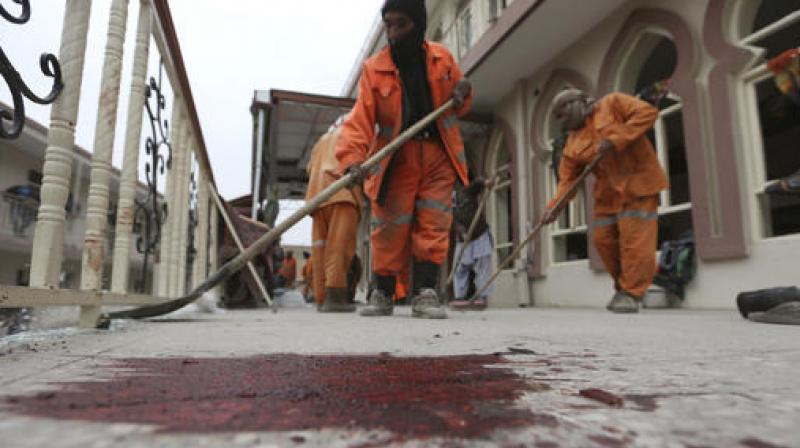Suicide bombing kills 32 at Kabul's Shia mosque, ISIS claims responsibility

Kabul: A massive suicide blast targeting Shiites killed at least 32 people and wounded 64 as worshippers gathered at a Kabul mosque Monday, officials said, the latest sectarian attack claimed by Islamic State in the Afghan capital.
The attacker was mingling with worshippers inside the Baqirul Olum mosque in the west of the city when he detonated the bomb, said senior police official Fridon Obaidi.
The blast around 12:30 pm left a large crater inside the two-storey mosque. Bodies covered in blood could be seen on the ground among shattered glass. Police cordoned off the area as ambulances rushed to the scene.
"I heard a blast and dust covered the whole mosque," said worshipper Nadir Ali.
"When the dust settled down, I saw the mosque was full of flesh and blood. I was injured in my waist and had to crawl out of the mosque."
Another worshipper, Ali Jan, said: "I was in the mosque, the people were offering prayers. Suddenly I heard a bang and windows broke. I had no idea what had happened. I rushed out screaming."
The worshippers were gathering for the major Shiite ceremony of Arbaeen marking the end of a 40-day mourning period after Ashura, which commemorates the death of Imam Hussein.
Hussein, grandson of the Prophet Muhammad, was assassinated in the year 680. His fate laid the foundation for the faith practised by the Shiite community, a minority in mainly Sunni Muslim Afghanistan.
The death toll given by Obaidi was confirmed by health ministry spokesman Mohammad Ismail Kawoosi, who said Monday evening the wounded toll had jumped from 35 to 64. Women and children were among the injured.
The UN gave a different toll of at least 32 dead and more than 50 wounded.
The Islamic State group claimed the attack in a statement via the jihadist-linked Amaq news agency.
President Ashraf Ghani said in a statement he strongly condemned the "barbaric" attack, which the UN called an "atrocity".
NATO commander in Afghanistan General John Nicholson offered condolences and the US embassy in Kabul also condemned the blast, which Amnesty International called "horrific and deliberate".
"(Afghan authorities) have a duty to take effective measures to protect Shia Muslims from attacks," said Champa Patel, Amnesty's South Asia director.
Call for security
Mosques in Kabul generally do not have any security -- though police patrols can be seen near some on Fridays -- and some eyewitnesses criticised the government over the lack of protection.
"They know that Daesh (IS), who is able to conduct attacks in Europe, can reach places in Afghanistan easily. They should provide security to sacred places," said one man who gave his name as Rahmat.
Last month a powerful blast targeting Shiites during Ashura killed 14 people in northern Afghanistan. It followed twin attacks claimed by IS that also targeted Shiites and killed 18 in Kabul.
In July IS jihadists claimed twin explosions that ripped through crowds of Shiite Hazaras in Kabul, killing at least 85 and wounding more than 400 others.
Those bombings marked the deadliest single attack in the Afghan capital since the Taliban were ousted from power in a 2001 US-led invasion.
Fighters from IS, which controls territory across Syria and Iraq, have been making steady inroads in Afghanistan, challenging the Taliban on their own turf, primarily in the country's east.
The Taliban, who are waging a bloody war to topple the US-backed Afghan government, said they were not involved in Monday's attack.
The assault underscores rising insecurity in the war-torn country nearly two years after US-led NATO forces formally ended their combat operations.
Millions of Shiite Muslim pilgrims gather each year in the holy Iraqi city of Karbala for the Arbaeen pilgrimage, one of the world's largest religious events. The pilgrimage is seen as a major potential target for sectarian attacks.

